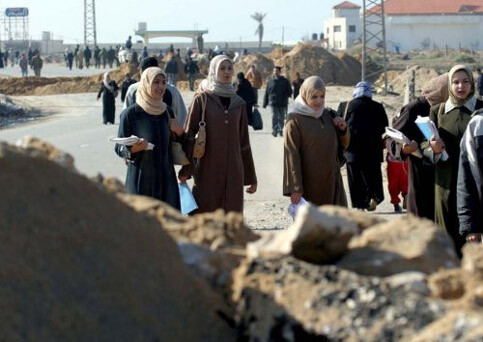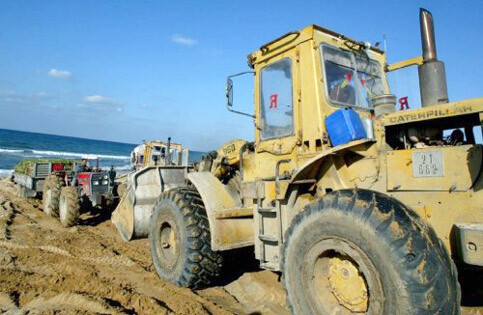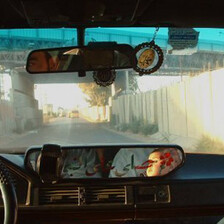Gaza City 16 December 2004

Palestinian students from Gaza take the coastal route during the Israeli siege. (WAFA)
WAFA —Thousands of Palestinian students, merchants, patients and drivers were forced to take cover behind trucks, vehicles and carts on the blocked Gaza coastal road when Israeli soldiers stationed at the watchtowers of Nitzarim colony opened fired on them as they were passing.
I took cover behind a truck along with two university students.
“Hey, hey, you are behind a fuel truck, leave now!” a cameraman shouted at us. We were shocked and fled from our spot behind the truck. The cameraman was warned by a hawker to hide his camera, as Israeli soldiers in the watchtowers target journalists. Taking his camera, he hid behind a truck carrying panels of wood.
Bullets were hitting vegetable boxes and other goods contained in a long queue of waiting trucks. A group of students and some elderly people jumped from a donkey cart and hurriedly sought cover behind a van carrying chickens.
Abdulaziz Mahmoud, a 20-year-old student, was holding his books and watching several carts moving along the cliff of the Gaza Sea. He was trying to reach his college in Khanyounis (situated south of Gaza), but he was unable to get there because of the road block. The Abu Holi checkpoint and the coastal road block have divided the Gaza Strip into three parts.
“I study nursing; I dislike missing any lecture. I am careful to attend all lectures, so I come and try to reach college,” he said. “Imagine if each student did not reach college; it means that academic life would be paralyzed. It is unfair, we must continue studying.”
Maisa Dwidar, 21, who studies computer science at the same college as Mahmoud, also expressed her feelings of deep sorrow.
“They (Israelis) do not only kill people, but they also kill our education, economy, humanity and future,” she said. “Why do they close the road? I was supposed to sit for an exam, what will I do now? You see, they kill our daily life,” Dwidar said, heaving a sigh as she left to return home.

A Caterpillar bulldozer pulls a tractor at the Gaza shore. Israeli forces block the coastal road preventing thousands of Palestinians to pass. (WAFA)
At the foot of the Gaza Sea cliff, an old man, Khalil Shamallakh, was hiding with his donkey cart. As he listened to the gunshots, he smoked and waited to resume his work. Shamallakh seizes the opportunity of the road block to take people from northern Gaza to the southern part by his cart.
“During the days of the blocks, I use my cart as a taxi. I take people from one side to the other for money, it is good for me; one man’s meat is another man’s poison,” Shamallakh said, a wide grin spreading on his wrinkled face.
“You know, I am not only afraid of being shot, but also afraid from the possibility of my donkey being shot. During previous closures, they killed many donkeys,” the old man said. “My donkey is the only resource for my living. If they kill my donkey it means that my family will face starvation”.
Jamal Madhoun, 47, had been waiting at the road block since the day before. “I slept in the truck, but my mother, children and wife walked along the beach and headed home. It was necessary for them to leave as my mother suffers diabetes,” said Madhoun. “It is sadist behaviour. It is unendurable life. How can we live in such a situation? It is unbelievable,” Madhoun added, sitting next to his truck that was packed with luggage.
Eventually, the sound of gunshots stopped and “life” at the coastal road resumed. The voices of the hawkers and the sound of horse bells ringing could be heard once again.
Waves from the sea were hitting the wheels of a truck as a yellow bulldozer dragged it along the sand. People have gathered around the coffin of a dead woman, as her family move the body from Shifa Hospital in Gaza to Deir Al-Balah City.
“Even the dead people also suffer from the Israeli closure. Yesterday…citizens were carrying the body of Mo’ayyad al-Agha, who was killed by Israeli soldiers,” Ahmad Abdullah, a relative of the dead woman, said.
Two handicapped people were heading home to Khanyounis after a visit to Gaza City. The crutches of Adel Al-Rozzi, from Nusairat Refugee Camp, became stuck in the white sand of the beach while two young men carried the wheelchair of a quadriplegic girl.
Drivers turned back to an immobile tractor, the driver awaiting the assistance of a bulldozer to help drag his tractor and a cart full of boxes of tomatoes. As this happens, photojournalists turned their cameras to the golden sun setting in the sea.





